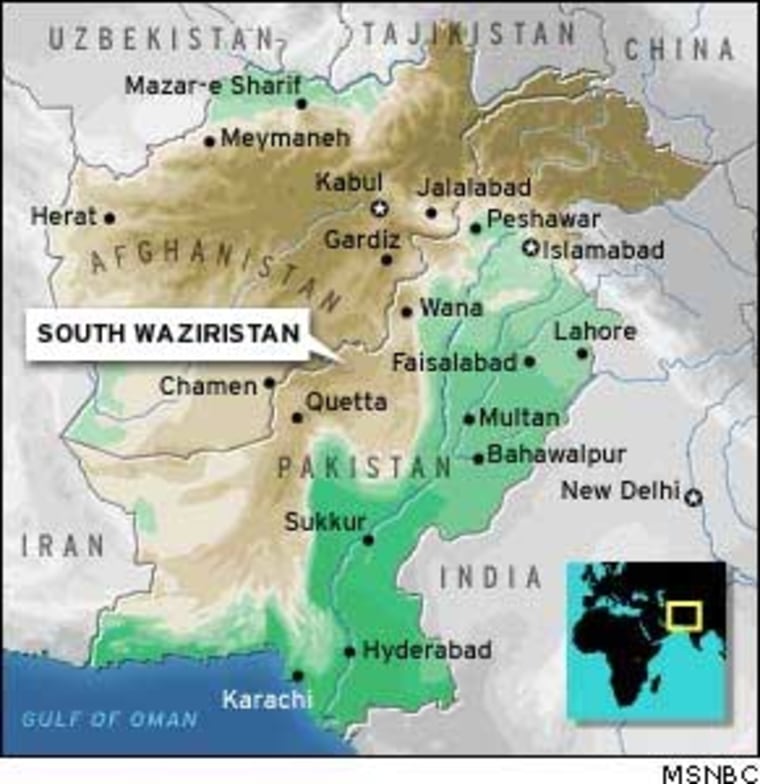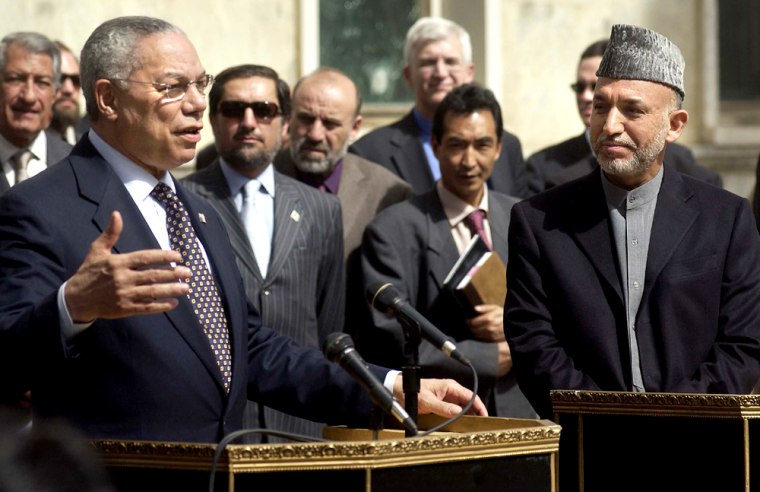Declaring that joint counterterrorism efforts have put al-Qaida on the defensive, U.S. Secretary of State Colin Powell arrived Wednesday for a fleeting visit to coalition forces in insurgency-wracked Afghanistan and talks with President Hamid Karzai.
Powell, on the second leg of a tour of South Asia and the Middle East, arrived from India and was due to visit Pakistan later Wednesday -- a day after Pakistani forces undertook their bloodiest counterterrorism operation yet near the Afghan border, leaving at least 33 people dead.
In an opinion piece published Wednesday in Pakistan's leading English-language newspaper, the top U.S. diplomat hailed Pakistan's alliance with Washington as "crucial to protecting both our countries, and the world, from terrorism."
"Our joint efforts have put al-Qaida on the defensive, and we will take the fight to them until (Osama) bin Laden and his supporters have been brought to justice and their networks are destroyed," Powell wrote in The News.
In Kabul, Powell was due to visit a girls' school where voters can register for landmark Afghan elections, slated for June.
Meeting with Karzai
The polls are key to bringing democracy to Afghanistan, recovering from a quarter century of conflict, but preparations have been slowed by continuing security problems, as insurgents of the former ruling Taliban and al-Qaida stage frequent attacks in the country's lawless south and east.

Powell was scheduled to meet with Karzai at the presidential palace in the capital. Roy Glover, a U.S. Embassy spokesman, said they will discuss security, Afghanistan's new constitution and the planned elections.
Karzai's spokesman Jawed Ludin said the president and Powell would discuss "matters of mutual interest," including an international donor conference on Afghanistan, planned in Berlin at the end of the month.
Powell will also visit a provincial base where U.S.-led coalition forces have been deployed to help improve security and promote reconstruction of the war-battered country, officials said.
Some 13,500 U.S.-led forces are hunting al-Qaida and Taliban rebels in Afghanistan, and earlier this month launched a new operation, hoping to trap bin Laden and Taliban leader Mullah Omar. The two top fugitives are widely believed to be hiding somewhere on the Afghan-Pakistan border.
Some 70,000 Pakistani forces have been deployed in the semiautonomous tribal regions near the border in the past two years -- the first such deployment since independence from Britain in 1947.
Pakistani counterterror fight
On Tuesday, Pakistan launched its latest counterterrorism operation in the tribal regions, leaving at least 24 suspects and nine paramilitary soldiers dead -- provoking anger in this Islamic country.
Powell said Tuesday in India that he would urge Pakistan to take greater military action along the Afghan border in an effort to capture former Taliban and al-Qaida suspects.
On Monday, a large bomb was defused outside the U.S. Consulate in Pakistan's southern city of Karachi. No suspects have been named in the thwarted attack, but suspicion is focused on Islamic extremists.
Powell, who is not due to visit Karachi, is also expected to raise concerns with Pakistani President Pervez Musharraf over nuclear proliferation out of Pakistan.
The U.S. diplomat said Tuesday he plans to ask whether Pakistani officials aided rogue scientist Abdul Qadeer Khan in leaking nuclear weapons technology to Iran, Libya and North Korea.
Musharraf has told U.S. officials that the Pakistani government was not in league with Khan's black market operation.
